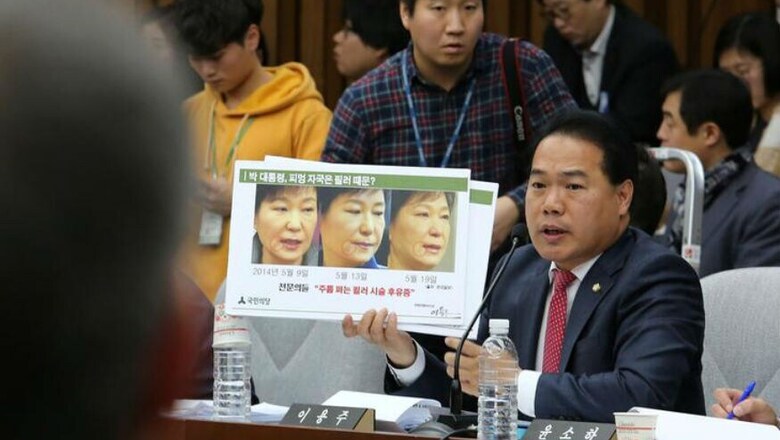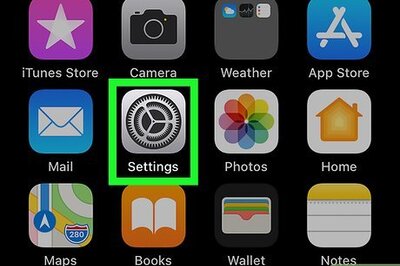
views
Seoul: At the start of President Park Geun-hye's term, physician Kim Sang-man was a frequent guest at Seoul's Blue House, exempt from thorough security checks, giving injections derived from human placenta to South Korea's most important patient.
Park's frequent medical and cosmetic treatments, including shots administered without the supervision of her official doctors, have been revealed in detail during investigations into a sweeping corruption scandal that is poised to cost her the presidency, raising questions over their safety and efficacy.
It has also fuelled criticism that doctors not appointed by the presidential office treated her over an extended period and continued to do so even after medical staff at her official Blue House residence became aware.
"We're talking about the president, not just anybody, so the official doctor has to be consulted and then make the decision," said Shin Hyun-dai, who served as a Blue House doctor for former President Roh Moo-hyun from 2003 to 2008.
"The official doctor needs to know even about pills given for indigestion. This is nonsense," said Shin, who practices Oriental medicine.
Kim said Park, who is 64 and has never married, suffered from insomnia and often became fatigued. He said he had gone into the Blue House to see Park a few times before being named a "consulting Blue House doctor" in August 2013, and several times after that.
He said he would visit Park's residential quarters after his shift at a clinic, when the president's medical staff were off duty.
"I would get a call that she is not well, and I would go in," Kim told a parliamentary hearing this week.
Kim would said he would give Park placenta extract injections, which are administered subcutaneously, or just under the outer layer of skin.
"Usually doctors treat illnesses but my speciality is I try to manage the condition before an illness," he said.
More common in East Asia than in the West, placental extract treatments have recently become popular in South Korea, but many doctors remain sceptical.
Huh Kap-bum, an endocrinologist who was former President Kim Dae-jung's official doctor from 1998 to 2002, said it would have been less controversial if Park had chosen to consult her official doctors for the same treatment.
But, he added: "I would have said to the president, no, because they are not proven safe."
MYSTERY PATIENT
Park's medical treatments had been shrouded in secrecy.
Kim had been a staff physician at Chaum, a clinic known for its detox and beauty care services, where Park was treated under a pseudonym before she was elected in December 2012, according to the clinic's president.
The Health Ministry has said prescriptions for an intravenous glucose and vitamin mix were issued for Park from 2012 to 2014, but that a Chaum doctor had fabricated records to show them as written for Park's friend Choi Soon-sil.
Choi has been indicted and is at the centre of the influence-peddling scandal that led to Park's impeachment last week in parliament, which must be confirmed or overturned by the Constitutional Court.
Last year, the Blue House bought 200 units of placenta extract and other products normally used for aesthetic purposes, according to a government database obtained and released by an opposition lawmaker in November.
The same record made headlines last month when it showed the purchase of 60 Viagra pills that the presidential office said were intended to ease altitude sickness for staff members during a trip to Africa earlier this year, but were never used.
Doctors and lawmakers have also said they suspect Park underwent procedures to reduce facial wrinkles, but none of the doctors known to have treated her have confirmed performing them.
Huh, the ex-Blue House doctor, said it was "abnormal" that there was not a better accounting of Park's treatments.
"It appears that the Blue House medical system didn't function normally. It is something that should not happen."
FOUNTAIN OF YOUTH?
Human placental extract therapy has been around for half a century in Japan, where the government approves its use in liver treatments and to ease symptoms of the menopause.
News reports about Park's enthusiasm for the injections has renewed public interest in the therapy, which can cost up to 100,000 won ($84.50) per visit, meaning the mark-up from a product supplied to clinics at about 5,500 won makes it a lucrative business.
Scientific evidence of the benefits of placental extract is thin.
A South Korean study in 2008 said women who received placenta extracts showed improvement in menopausal symptoms linked to reduced oestrogen levels.
A few other studies, including a 1998 paper by a team of University of Tokyo scientists and another in 2013 by South Korean doctors, found evidence human placental extract may stimulate liver regeneration in rats, but there have been insufficient clinical trials to substantiate the benefits to humans.
"Medically, the proven effect of placenta injections remains fairly weak, but doctors are free to prescribe them," said Shin Hyun-young, professor of family medicine at Myongji Hospital and former spokeswoman of the Korean Medical Association.
Protein, amino acids and vitamins and other compounds found in the substance are purported to alleviate fatigue and fight inflammation.
"I don't recommend it because there is some debate about it," Lee Byung-seok, an obstetrics and gynaecology specialist who was Park's official doctor while Kim provided placenta shots, told the parliamentary hearing.
















Comments
0 comment